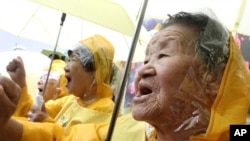South Korean politicians and media have criticized recent comments by a senior U.S. official, saying she appeared to be taking sides with Japan in historical and other disputes with its neighbors South Korea and China.
Wendy Sherman, U.S. Under Secretary of State for Political Affairs, told a Washington conference on Friday that disputes over history, including the issue of comfort women who were forced to work in Japanese military brothels during World War II, were major obstacles to progress in relations between Seoul, Beijing and Tokyo. Sherman warned political leaders against using the historical disputes for political gains.
“Of course, nationalist feelings can still be exploited, and it’s not hard for a political leader anywhere to earn cheap applause by vilifying a former enemy. But such provocations produce paralysis, not progress,” the diplomat said.
Sherman’s comments drew widespread criticism from South Korea. Politicians from both conservative and liberal parties condemned her remarks, accusing the U.S. official of being insensitive to the suffering of Koreans under Japanese colonial rule. Some accused Sherman of taking sides with Japan by turning a blind eye to the country’s wartime atrocities.
“A senior U.S. official has taken sides with Japanese Prime Minister Shinzo Abe in his efforts to whitewash the colonial misdeeds of his country,” The Korea Times, an English daily in South Korea, argued.
Washington has been trying not to get tangled in the dispute between the allies. On Monday, the State Department tried to play down the controversy by condemning Japan’s wartime actions, while calling on all sides to make efforts to resolve the issue.
“The trafficking of women for sexual purposes by the Japanese military during World War II was a terrible, egregious violation of human rights. President Obama has said it is in the interest of both the Japanese and the Korean people to look forward as well as backwards and to find ways in which the heartache and the pain of the past can be resolved, because the interests today of the Korean and Japanese people so clearly converge,” said a State Department official.
Some historians estimate that as many as 200,000 comfort women were forced into the Japanese Army’s brothels during World War II. Recently, Japan’s government has launched an intensive campaign to promote a different portrayal of the issue, claiming the comfort women were professional prostitutes, drawing strong protests from South Korea.




